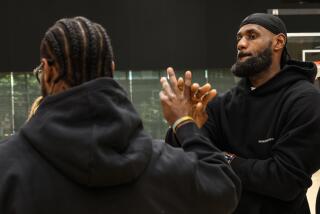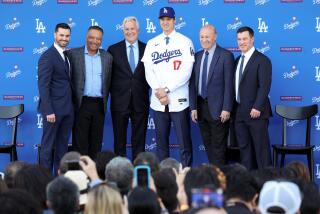Ninety-Eight Days of Legwork Wasted, but at Least He Wasn’t Scooped
- Share via
I knew I was in trouble when I started having dreams--no, nightmares--about Brad Fullmer.
They went something like this: I pick up a copy of the Daily News, read a headline that says, “Fullmer signs with Expos.” The subhead: “Fletcher gets smoked.”
I would wake up in a cold sweat.
Sick, isn’t it?
We in the news-gathering business fear nothing more than the competition gathering more news. The reason the Brad Fullmer negotiations were such a headache to me was because the story seemed to last forever.
Ninety-eight days, to be exact. One quarter of my year spent hanging on the whim of an 18-year-old kid.
Fullmer was a standout hitter last spring at Montclair Prep. Despite a strong commitment to play college baseball at Stanford and valid questions about the infielder’s defensive abilities--or lack thereof--the Montreal Expos selected him in the second round of the June amateur draft.
Then the fun began.
The three other area players drafted in the second round--Hoover’s Nate Dishington, Crespi’s Jeff Suppan, and Newbury Park’s David Lamb--all signed by the end of the July, but Fullmer lingered.
And lingered. And lingered.
I talked to his father, Marv, about once a week. Conversations went something like this:
Jeff: “Hi, Marv, how’s it going?”
Marv: “Fine. How about yourself?”
Jeff: “Oh, great. . . . Any news with Brad?”
Marv: “Nope. Nothing. We’re in no hurry, you know.”
Jeff: “I noticed.”
This went on for months. There were rumors that he’d signed several times, but none were true. The talk was that the Fullmer family was asking for something in the $400,000 range, about twice what second-round picks can reasonably expect.
By late August, Fullmer had neither signed nor ended the negotiations. I went to San Diego to write a feature on the Area Code Games, a baseball drool-a-thon in which about 200 professional scouts show up to evaluate some of the West’s best high school players, Class of 1994. Somewhere in the crowd was Scott Stanley, the Expos’ scout who had been dealing with the Fullmers.
When I finally found Stanley--and finding a particular scout at the Area Code Games is like finding a particular cornflake in a box of cereal--I asked him about the Fullmer negotiations.
“I think we’re close,” he said.
Close, it turned out, was a relative term. Three more weeks passed before anything happened. On Wednesday, Sept. 8, Stanley told me he was going to the Fullmers that night to present the Expos’ final offer.
I called the Fullmer home several times that evening. “Sorry,” they said, “we’re still negotiating.”
“If you reach an agreement by 10 o’clock,” I said, “give me a call.”
That was the latest we could have slipped the news under our deadline for the next day’s paper. At 10 I had heard nothing, so I made a final call to the house. No answer.
Turns out Fullmer had signed moments earlier. He didn’t pick up his call-waiting to talk to me because he was on the phone making arrangements to go to West Palm Beach, Fla., where the Expos’ instructional league team plays.
Fullmer had signed for $417,500 cash, plus about $100,000 for college. He proudly announced it the next day to me and the Daily News and anyone else who cared.
Three months of legwork had gone down the drain.
Fullmer probably didn’t care about my problems, and I don’t really blame him. He, after all, was rich, having just accepted the largest bonus ever paid to a second-round pick. The wait was obviously worthwhile to him.
“So,” I asked Fullmer the day after he signed, “are you glad this is all over?”
“Yep,” he said.
That made two of us, except I didn’t have $417,500.
More to Read
Go beyond the scoreboard
Get the latest on L.A.'s teams in the daily Sports Report newsletter.
You may occasionally receive promotional content from the Los Angeles Times.










